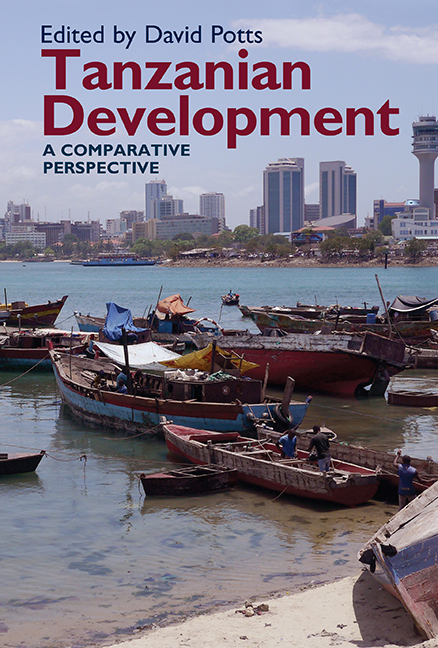Book contents
- Frontmatter
- Contents
- List of Illustrations
- Contributors
- Acknowledgements
- 1 Introduction – Tanzanian Development: A Comparative Perspective
- 2 The Political Economy of Tanzania 1967–2017: Reimagining the State
- 3 Reflections on the Tanzanian Trajectory: Decline and Recovery
- 4 Agricultural Development in Tanzania
- 5 Assets and Poverty Dynamics: The Methodological Challenges of Constructing Longitudinal Surveys in Tanzania
- 6 Contract Farming in Tanzania: Experiences from Tobacco and Sunflower
- 7 ‘We Just Sell Water – That is All We Do’: Two Cases of Small-scale Irrigation in Tanzania
- 8 The Industrial Development of Tanzania in Comparative African Perspective
- 9 Competitiveness in African Manufacturing: Some Evidence from Tanzania
- 10 ‘Good Life Never Comes Like Dreams’: Youth, Poverty and Employment in Arusha
- 11 International Aid to Tanzania – with some comparisons from Ghana and Uganda
- 12 Real Exchange Rate Changes and Export Performance in Tanzania and Ethiopia
- 13 Economic Leakage as a Constraint on Tourism's Effective Contribution to Local Economic Development in Tanzania
- 14 Extractive Industry Revenues and their Expenditure in Local Government Authorities: The Case of the Gold Service Levy in Geita District Council in Tanzania
- 15 Conclusion
- References
- Index
13 - Economic Leakage as a Constraint on Tourism's Effective Contribution to Local Economic Development in Tanzania
Published online by Cambridge University Press: 24 October 2019
- Frontmatter
- Contents
- List of Illustrations
- Contributors
- Acknowledgements
- 1 Introduction – Tanzanian Development: A Comparative Perspective
- 2 The Political Economy of Tanzania 1967–2017: Reimagining the State
- 3 Reflections on the Tanzanian Trajectory: Decline and Recovery
- 4 Agricultural Development in Tanzania
- 5 Assets and Poverty Dynamics: The Methodological Challenges of Constructing Longitudinal Surveys in Tanzania
- 6 Contract Farming in Tanzania: Experiences from Tobacco and Sunflower
- 7 ‘We Just Sell Water – That is All We Do’: Two Cases of Small-scale Irrigation in Tanzania
- 8 The Industrial Development of Tanzania in Comparative African Perspective
- 9 Competitiveness in African Manufacturing: Some Evidence from Tanzania
- 10 ‘Good Life Never Comes Like Dreams’: Youth, Poverty and Employment in Arusha
- 11 International Aid to Tanzania – with some comparisons from Ghana and Uganda
- 12 Real Exchange Rate Changes and Export Performance in Tanzania and Ethiopia
- 13 Economic Leakage as a Constraint on Tourism's Effective Contribution to Local Economic Development in Tanzania
- 14 Extractive Industry Revenues and their Expenditure in Local Government Authorities: The Case of the Gold Service Levy in Geita District Council in Tanzania
- 15 Conclusion
- References
- Index
Summary
Introduction
The structure of the Tanzanian economy has changed significantly since independence, and particularly after economic liberalization in the 1980s and further reforms in the mid-1990s. The gradual move towards a free market economy was transformative for the tourism industry, which showed rapid growth year on year from 1995 onwards. International tourist arrivals in 1995 stood at 295,312, with a sharp increase to 627,325 by 1999. Following a period of decline, arrivals returned to a steady growth of about 10 per cent from 2006, with 644,124 arrivals rising to 1,140,156 in 2014 (Table 13.1. See below, p. 261). Contributions from tourism to employment, GDP and foreign exchange earnings have increased in a similar way over this period. In 2013 the total contributions of tourism to employment, GDP and foreign exchange earnings were 11 per cent, 13 per cent and 18 per cent respectively (WTTC 2015). By 2025, the country aims to attract 8 million international tourists and has recently been awarded a US$100 million loan from the World Bank group to implement a series of projects in four key natural resource areas (Tanzania Investment Centre 2017). Despite these impressive tourism facts and projected figures, the effective contribution of tourism to local socio-economic development can be questioned, as evidence suggests that there is unequal distribution of wealth derived from tourism and precarious employment opportunities (Kinyondo & Pelizzo 2015).
This chapter begins with an overview of Tanzania's tourism industry from the latter years of the colonial period to the present day. Subsequently, socio-economic trends relating to tourism development in Tanzania since economic liberalization are discussed, followed by a review of the literature on economic leakage and its impact on Tanzania's economy. The chapter goes on to present best practice case studies where the contribution and distribution of tourism benefits are equitable, before ending with some policy-relevant implications.
A Brief History of Tourism Development in Tanzania
Tanzania, like much of East and Southern Africa, was a ‘hunters’ playground’ in the late 1800s and early 1900s for the colonial rulers, and indeed the export of ivory and animal skins was a particularly lucrative business. Big game hunting was also an elite sport and attracted high-profile hunters, such as Frederick Selous, Winston Churchill and Theodore Roosevelt, whose motivation to hunt was for prestige and status or for ‘scientific and educational purposes’, rather than financial gain (MacKenzie 1997).
- Type
- Chapter
- Information
- Tanzanian DevelopmentA Comparative Perspective, pp. 258 - 272Publisher: Boydell & BrewerPrint publication year: 2019
- 2
- Cited by

